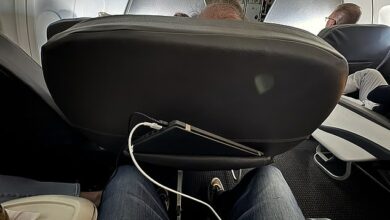Israel kills top Hezbollah commander, who responds with rocket attack

Israeli forces killed a top Hezbollah commander in a drone strike in southern Lebanon on Wednesday, prompting Lebanese militias to respond with a heavy rocket attack across the border.
The flare-up came as Western diplomats tried to prevent a full-scale war between Israel and Hezbollah, a danger that appears to have grown in recent weeks. Cross-border firefights have intensified and Israeli officials have spoken publicly about shifting their military focus from Hamas in the Gaza Strip to Hezbollah, a far more sophisticated and potent threat.
Amos Hochstein, a senior White House adviser who has become the de facto U.S. envoy for efforts to contain the conflict between Israel and Hezbollah, met with French officials in Paris on Wednesday to discuss ways to ease rising tensions. Jean-Yves Le Drian, President Emmanuel Macron’s special envoy to Lebanon, was among those he spoke with, according to a person close to the talks, who spoke on condition of anonymity to discuss sensitive diplomacy.
The Israeli military said its drone strike had killed Mohammad Naameh Nasser, also known as Abu Naameh. He was one of the highest-ranking Hezbollah fighters killed in nearly nine months of conflict, according to a senior Lebanese intelligence official, who spoke on condition of anonymity to discuss the sensitive matter. He said Mr. Nasser had led Hezbollah’s Aziz unit, one of the group’s main forces along the Lebanese border.
Hezbollah confirmed his death, and while it did not explicitly say how he died, the group said it had fired 100 rockets at military targets across the border as part of an “initial response,” setting off sirens in communities in northern Israel. The Israeli military said most of the barrage fell in open areas, but Hezbollah continued to claim late into the evening that there had been retaliatory strikes.
In solidarity with Hamas, Hezbollah, which is closely allied with Iran, has dramatically increased the pace of its periodic attacks on northern Israel since the Gaza war began in October. Israel has retaliated with attacks in Lebanon.
Mr. Naameh’s killing in a drone strike in the Tyre area on the western coast was the latest in a series of Israeli assassinations of Hezbollah commanders in Lebanon, sparking an escalation in fighting last month that the Biden administration has since tried to contain. With tensions already high, analysts and Western diplomats have warned that the tit-for-tat attacks could lead to further escalation.
Amal Saad, a lecturer at Cardiff University who researches Hezbollah, said the powerful militia would not be drawn into an all-out war for the sake of killing, but that recent threats from Israeli officials would not deter Hezbollah from responding with force.
“I don’t think Hezbollah will downplay this,” Ms. Saad said, adding that the rocket attack was only “a small harbinger of what is to come.”
The conflict between Israel and Hezbollah has remained relatively contained so far, but the fighting has displaced more than 150,000 people on both sides of the border. If a full-scale war were to break out, analysts said, it would likely be catastrophic, leaving large swaths of Lebanon in ruins, prompting Hezbollah to unleash its arsenal of precision-guided missiles on cities across Israel and potentially sparking a broader regional war with Iran. Israel’s military leadership is seeking a ceasefire with Hamas in case a larger war breaks out in Lebanon, Israeli security officials said.
U.S. officials have worked for months to prevent a war between Israel and Hezbollah. On Monday, Secretary of State Antony J. Blinken said Israel has “effectively lost sovereignty” near its border with Lebanon as Hezbollah attacks from across the border have driven much of the population from their homes. Some 60,000 Israelis have fled the area, many of whom have been living in Tel Aviv hotels for the past nine months.
In his remarks on Monday, Mr. Blinken noted that Hezbollah had said that if a ceasefire was reached in Gaza, it would stop firing into Israel. That “underscores why a ceasefire in Gaza is so critical,” he said.
Ceasefire talks have been deadlocked since June, but officials said Wednesday that mediators are working to revive negotiations, focusing on terms based on a proposal backed by the United Nations and the United States.
For months, Israel and Hamas, which do not talk directly, have been negotiating through mediators including Qatar and Egypt over a possible deal for a three-phase ceasefire in Gaza and the release of the remaining 120 hostages held there, both living and dead. But major differences remained on key issues.
Qatar sent Hamas new possible changes to the proposed deal on Tuesday in an effort to win Hamas’ support, according to two senior officials from different countries involved in the negotiations, who spoke on condition of anonymity to discuss the sensitive talks.
The biggest stumbling blocks remain: Hamas, which controlled Gaza before the conflict, wants an end to the war and a complete withdrawal of Israeli troops, while Israel has vowed to continue fighting until Hamas is destroyed and wants control over security in Gaza after the war.
Current and former security officials in Israel say the country’s top generals want to initiate a ceasefire in Gaza, even if Hamas remains in power for the time being. Israeli generals see their forces becoming scarce, both in soldiers and ammunition, as the war drags on. They believe the army needs time to recover in case a ground war with Hezbollah breaks out, the officials said.
Israeli Defense Minister Yoav Gallant said Wednesday that the Israeli military is prepared to take all necessary measures against Hezbollah, but that it prefers a diplomatic solution.
“We are hitting Hezbollah very hard every day and we will also reach a state of full readiness to take any necessary action in Lebanon, or to make a settlement from a position of strength,” Mr. Gallant said, according to a statement from his office.
“We prefer a settlement, but if reality forces us, we know how to fight,” he added.
Michael Crowley, Ronen Bergman, Aaron Bokserman, Patrick Koningsley And Johnatan Reiss contributed to the reporting.




